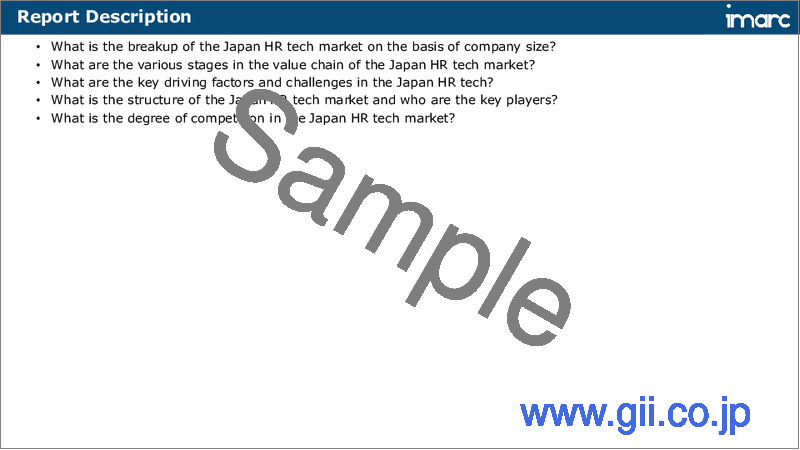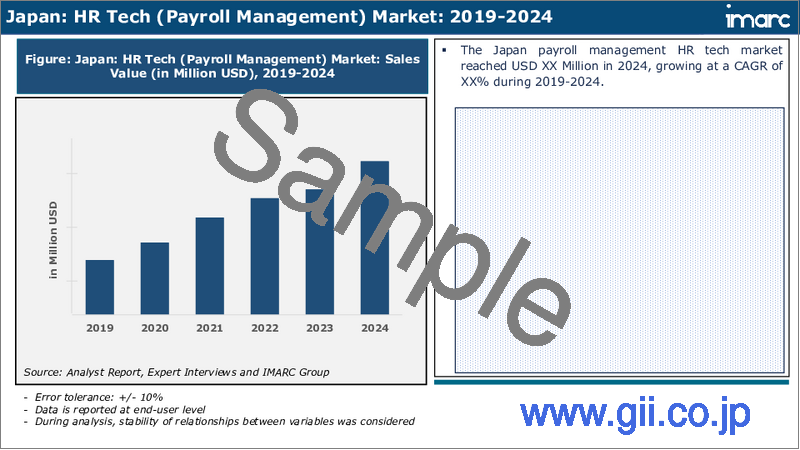|
|
市場調査レポート
商品コード
1746545
日本のHRテック市場レポート:用途、タイプ、最終用途産業、企業規模、地域別、2025年~2033年Japan HR Tech Market Report by Application, Type, End Use Industry (TTH, Public Sector, Health Care, Information Technology, BFSI, and Others), Company Size, and Region 2025-2033 |
||||||
カスタマイズ可能
|
|||||||
| 日本のHRテック市場レポート:用途、タイプ、最終用途産業、企業規模、地域別、2025年~2033年 |
|
出版日: 2025年06月02日
発行: IMARC
ページ情報: 英文 116 Pages
納期: 5~7営業日
|
全表示
- 概要
- 目次
日本のHRテック市場規模は2024年に20億米ドルに達しました。今後、IMARC Groupは、同市場が2033年までに39億米ドルに達し、2025年から2033年にかけて6.94%の成長率(CAGR)を示すと予測しています。全国的な労働人口の減少、従業員体験への注目の高まり、規制遵守要件の厳格化、人工知能(AI)と機械学習(ML)の継続的な技術進歩は、市場を牽引する主な要因のいくつかを表しています。
本レポートで扱う主な質問
- 日本のHRテック市場はこれまでどのように推移し、今後どのように推移していくのか?
- COVID-19が日本のHRテック市場に与えた影響は?
- 日本のHRテック市場の用途別区分は?
- 日本のHRテック市場のタイプ別区分は?
- 日本のHRテック市場の最終用途産業別区分は?
- 日本のHRテック市場の企業規模別区分は?
- 日本のHRテック市場のバリューチェーンにおける各ステージとは?
- 日本のHRテック市場の主要な促進要因と課題は何か?
- 日本のHRテック市場の構造と主要企業は?
- 日本のHRテック市場における競合の程度は?
目次
第1章 序文
第2章 調査範囲と調査手法
- 調査の目的
- ステークホルダー
- データソース
- 市場推定
- 調査手法
第3章 エグゼクティブサマリー
第4章 日本のHRテック市場-イントロダクション
- 概要
- 市場力学
- 業界動向
- 競合情報
第5章 日本のHRテック市場情勢
- 過去および現在の市場動向(2019~2024年)
- 市場予測(2025~2033年)
第6章 日本のHRテック市場- 用途別の内訳
- タレントマネジメント
- 給与管理
- パフォーマンス管理
- 人材管理
- 採用
- その他
第7章 日本のHRテック市場- タイプ別の内訳
- 社内
- アウトソーシング
第8章 日本のHRテック市場- 最終用途産業別の内訳
- TTH(旅行、交通、ホスピタリティ)
- 公共部門
- 健康管理
- 情報技術
- BFSI(銀行、金融サービス、保険)
- その他
第9章 日本のHRテック市場- 企業規模別の内訳
- 従業員数1,000人未満
- 従業員数1,000~5,000人
- 従業員数5,000人以上
第10章 日本のHRテック市場-競合情勢
- 概要
- 市場構造
- 市場企業のポジショニング
- 主要成功戦略
- 競合ダッシュボード
- 企業評価象限
第11章 主要企業のプロファイル
第12章 日本のHRテック市場- 業界分析
- 促進要因・抑制要因・機会
- ポーターのファイブフォース分析
- バリューチェーン分析
第13章 付録
The Japan HR tech market size reached USD 2.0 Billion in 2024. Looking forward, IMARC Group expects the market to reach USD 3.9 Billion by 2033, exhibiting a growth rate (CAGR) of 6.94% during 2025-2033. A shrinking workforce across the country, rising focus on employee experience, stringent regulatory compliance requirements, and ongoing technological advancements in artificial intelligence (AI) and machine learning (ML) represent some of the key factors driving the market.
HR Tech, short for Human Resources Technology, refers to the software and hardware used by organizations to manage and enhance their HR processes. The primary focus of HR Tech is to streamline traditional HR functions like payroll, recruitment, employee records management, and performance evaluation. At present, HR Tech is embracing automation, using tools like Artificial Intelligence (AI) and Machine Learning (ML) to transform the way HR departments operate. These technologies are enabling more efficient data processing, providing insights into employee engagement and productivity, and improving the recruitment process through advanced candidate screening and predictive analytics. Besides this, HR Tech significantly contributes to enhancing the employee experience. Modern HR platforms are incorporating user-friendly interfaces and mobile accessibility, making it easier for employees to access HR services and information. HR Tech also plays a crucial role in promoting diversity and inclusion in the workplace. Tools are being developed to mitigate unconscious bias in hiring processes and to analyze workplace diversity metrics, supporting more equitable and inclusive organizational cultures. As organizations continue to navigate a dynamic business environment, HR Tech is providing critical support in managing workforce challenges, adapting to new working models such as remote work, and maintaining compliance with evolving labor laws and regulations. As a result, HR Tech is rapidly gaining traction as a vital component in the strategic planning and operational efficiency of modern businesses.
Japan HR Tech Market Trends:
The Japan HR tech market is currently experiencing significant growth, propelled by a combination of socio-economic factors, technological advancements, and changing workforce dynamics. A shrinking workforce across the country and the need for improved productivity and efficiency in HR processes represent the primary factors driving the market growth. Moreover, Japan's aging population and declining birthrate are leading to a workforce shortage. This demographic shift is accelerating the adoption of HR Tech solutions to manage talent more effectively, particularly in sourcing and retaining employees. Companies are increasingly leveraging HR Tech to streamline their recruitment processes, targeting a broader talent pool, including underrepresented groups like women and older workers. Additionally, technological advancements, particularly in artificial intelligence (AI) and machine learning (ML), represent another major growth-inducing factor. These technologies are being integrated into HR systems to automate routine tasks, analyze employee data for insights into engagement and productivity, and enhance decision-making processes. AI-powered tools are aiding in talent acquisition, performance management, and employee training, making these processes more efficient and data-driven, further catalyzing market growth. Moreover, the changing nature of work, spurred by the coronavirus (COVID-19) pandemic, has impelled the HR Tech market in Japan. Along with this, the rise of remote work and the escalating need for flexible work arrangements have necessitated the adoption of digital tools for virtual collaboration, employee engagement, and performance tracking. HR Tech solutions are facilitating these new work models by providing platforms for remote employee management and communication, thus stimulating market growth. Furthermore, Japanese companies are focusing on enhancing employee experience and engagement, recognizing the impact on productivity and retention. HR Tech is enabling personalized employee experiences through tailored training programs, wellness initiatives, and feedback mechanisms. In line with this, the heightened need for compliance with labor laws and the increasing emphasis on diversity and inclusion in the workplace are facilitating the development of tools to ensure regulatory compliance and support more inclusive hiring practices, thereby fueling market growth.
Japan HR Tech Market Segmentation:
Application Insights:
- Talent Management
- Payroll Management
- Performance Management
- Workforce Management
- Recruitment
- Others
Type Insights:
- Inhouse
- Outsourced
End Use Industry Insights:
- TTH (Travel, Transportation, Hospitality)
- Public Sector
- Health Care
- Information Technology
- BFSI (Banking, Financial services, and Insurance)
- Others
Company Size Insights:
- Less Than 1k Employees
- 1k -5k Employees
- Greater Than 5k Employees
Competitive Landscape:
The market research report has also provided a comprehensive analysis of the competitive landscape. Competitive analysis such as market structure, key player positioning, top winning strategies, competitive dashboard, and company evaluation quadrant has been covered in the report. Also, detailed profiles of all major companies have been provided.
Key Questions Answered in This Report:
- How has the Japan HR tech market performed so far and how will it perform in the coming years?
- What has been the impact of COVID-19 on the Japan HR tech market?
- What is the breakup of the Japan HR tech market on the basis of application?
- What is the breakup of the Japan HR tech market on the basis of type?
- What is the breakup of the Japan HR tech market on the basis of end use industry?
- What is the breakup of the Japan HR tech market on the basis of company size?
- What are the various stages in the value chain of the Japan HR tech market?
- What are the key driving factors and challenges in the Japan HR tech?
- What is the structure of the Japan HR tech market and who are the key players?
- What is the degree of competition in the Japan HR tech market?
Table of Contents
1 Preface
2 Scope and Methodology
- 2.1 Objectives of the Study
- 2.2 Stakeholders
- 2.3 Data Sources
- 2.3.1 Primary Sources
- 2.3.2 Secondary Sources
- 2.4 Market Estimation
- 2.4.1 Bottom-Up Approach
- 2.4.2 Top-Down Approach
- 2.5 Forecasting Methodology
3 Executive Summary
4 Japan HR Tech Market - Introduction
- 4.1 Overview
- 4.2 Market Dynamics
- 4.3 Industry Trends
- 4.4 Competitive Intelligence
5 Japan HR Tech Market Landscape
- 5.1 Historical and Current Market Trends (2019-2024)
- 5.2 Market Forecast (2025-2033)
6 Japan HR Tech Market - Breakup by Application
- 6.1 Talent Management
- 6.1.1 Overview
- 6.1.2 Historical and Current Market Trends (2019-2024)
- 6.1.3 Market Forecast (2025-2033)
- 6.2 Payroll Management
- 6.2.1 Overview
- 6.2.2 Historical and Current Market Trends (2019-2024)
- 6.2.3 Market Forecast (2025-2033)
- 6.3 Performance Management
- 6.3.1 Overview
- 6.3.2 Historical and Current Market Trends (2019-2024)
- 6.3.3 Market Forecast (2025-2033)
- 6.4 Workforce Management
- 6.4.1 Overview
- 6.4.2 Historical and Current Market Trends (2019-2024)
- 6.4.3 Market Forecast (2025-2033)
- 6.5 Recruitment
- 6.5.1 Overview
- 6.5.2 Historical and Current Market Trends (2019-2024)
- 6.5.3 Market Forecast (2025-2033)
- 6.6 Others
- 6.6.1 Historical and Current Market Trends (2019-2024)
- 6.6.2 Market Forecast (2025-2033)
7 Japan HR Tech Market - Breakup by Type
- 7.1 Inhouse
- 7.1.1 Overview
- 7.1.2 Historical and Current Market Trends (2019-2024)
- 7.1.3 Market Forecast (2025-2033)
- 7.2 Outsourced
- 7.2.1 Overview
- 7.2.2 Historical and Current Market Trends (2019-2024)
- 7.2.3 Market Forecast (2025-2033)
8 Japan HR Tech Market - Breakup by End Use Industry
- 8.1 TTH (Travel, Transportation, Hospitality)
- 8.1.1 Overview
- 8.1.2 Historical and Current Market Trends (2019-2024)
- 8.1.3 Market Forecast (2025-2033)
- 8.2 Public Sector
- 8.2.1 Overview
- 8.2.2 Historical and Current Market Trends (2019-2024)
- 8.2.3 Market Forecast (2025-2033)
- 8.3 Health Care
- 8.3.1 Overview
- 8.3.2 Historical and Current Market Trends (2019-2024)
- 8.3.3 Market Forecast (2025-2033)
- 8.4 Information Technology
- 8.4.1 Overview
- 8.4.2 Historical and Current Market Trends (2019-2024)
- 8.4.3 Market Forecast (2025-2033)
- 8.5 BFSI (Banking, Financial services, and Insurance)
- 8.5.1 Overview
- 8.5.2 Historical and Current Market Trends (2019-2024)
- 8.5.3 Market Forecast (2025-2033)
- 8.6 Others
- 8.6.1 Historical and Current Market Trends (2019-2024)
- 8.6.2 Market Forecast (2025-2033)
9 Japan HR Tech Market - Breakup by Company Size
- 9.1 Less Than 1k Employees
- 9.1.1 Overview
- 9.1.2 Historical and Current Market Trends (2019-2024)
- 9.1.3 Market Forecast (2025-2033)
- 9.2 1k -5k Employees
- 9.2.1 Overview
- 9.2.2 Historical and Current Market Trends (2019-2024)
- 9.2.3 Market Forecast (2025-2033)
- 9.3 Greater Than 5k Employees
- 9.3.1 Overview
- 9.3.1 Historical and Current Market Trends (2019-2024)
- 9.3.2 Market Forecast (2025-2033)
10 Japan HR Tech Market - Competitive Landscape
- 10.1 Overview
- 10.2 Market Structure
- 10.3 Market Player Positioning
- 10.4 Top Winning Strategies
- 10.5 Competitive Dashboard
- 10.6 Company Evaluation Quadrant
11 Profiles of Key Players
- 11.1 Company A
- 11.1.1 Business Overview
- 11.1.2 Services Offered
- 11.1.3 Business Strategies
- 11.1.4 SWOT Analysis
- 11.1.5 Major News and Events
- 11.2 Company B
- 11.2.1 Business Overview
- 11.2.2 Services Offered
- 11.2.3 Business Strategies
- 11.2.4 SWOT Analysis
- 11.2.5 Major News and Events
- 11.3 Company C
- 11.3.1 Business Overview
- 11.3.2 Services Offered
- 11.3.3 Business Strategies
- 11.3.4 SWOT Analysis
- 11.3.5 Major News and Events
- 11.4 Company D
- 11.4.1 Business Overview
- 11.4.2 Services Offered
- 11.4.3 Business Strategies
- 11.4.4 SWOT Analysis
- 11.4.5 Major News and Events
- 11.5 Company E
- 11.5.1 Business Overview
- 11.5.2 Services Offered
- 11.5.3 Business Strategies
- 11.5.4 SWOT Analysis
- 11.5.5 Major News and Events
12 Japan HR Tech Market - Industry Analysis
- 12.1 Drivers, Restraints, and Opportunities
- 12.1.1 Overview
- 12.1.2 Drivers
- 12.1.3 Restraints
- 12.1.4 Opportunities
- 12.2 Porters Five Forces Analysis
- 12.2.1 Overview
- 12.2.2 Bargaining Power of Buyers
- 12.2.3 Bargaining Power of Suppliers
- 12.2.4 Degree of Competition
- 12.2.5 Threat of New Entrants
- 12.2.6 Threat of Substitutes
- 12.3 Value Chain Analysis






